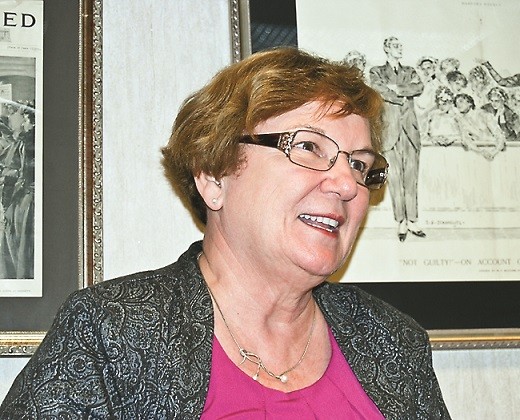Knoxville attorney Wanda Sobieski is described as aggressive. And formidable. She says she is just stubborn. It was likely that characteristic that led her to become the first female partner of the Baker Worthington law firm, the year of its centennial anniversary.
“It only took 100 years to get its first woman partner.”
She also founded the Women’s Suffrage Coalition and led efforts to install a memorial to women’s suffrage on Market Square. It recognizes the role Tennessee played in passage of the 19th Amendment, giving women the right to vote. It was the Tennessee legislature’s vote that ensured final passage of the historic amendment to the U.S. Constitution.
Sobieski grew up in Kansas and got her bachelor’s degree from Wichita State University in 1969. She was teaching in New Hampshire and Vermont and “the weather was oppressive and the culture” didn’t suit, so she and her first husband headed south for warmer weather. She wound up getting her master’s degree at the University of Tennessee in 1974. She was denied a teaching-assistant position because she was a mother, and the committee decided she couldn’t do both.
“I began calling around Knoxville to see what I could do. I found that lawyers didn’t seem to know much about sex discrimination.” She saw a notice for the Law School Admissions Test (LSAT), took it and enrolled at the UT College of Law. It was there that she met her Moot Court judge, John Sobieski. After she graduated, in 1982 they began dating and have now been married for 31 years. She has three children and five grandchildren.
After 11 years at Baker Worthington (now Baker Donelson) she founded her own firm, Sobieski Messer and Associates, in 1993. (It’s now Sobieski, Messer & Elledge). At Baker Worthington she had worked on construction cases, like the tangled and complicated legal case in the construction of Thompson-Boling Arena, which featured change orders and cost overruns that almost killed the project. Such cases took a long time and usually resulted in settlements. To keep her courtroom skills sharp she also did domestic cases, “which nearly always go to trial.” With her own firm she did not have a large team to handle construction cases, so she specialized in family law, civil rights and sex discrimination cases.
Has she helped a mother get a teaching-assistant position? She laughs. “I’ve tangled with UT quite a bit on personnel issues.”
She is a founding member and past president of the East Tennessee Lawyers Association for Women (ETLAW) and the Tennessee Lawyers Association for Women (TLAW).
When the effort to pass the Equal Rights Amendment failed, she was “shocked by the opposition. People were vehemently opposed to women’s rights.”
She was asked to serve on a state commission celebrating the 75th anniversary of women winning the right to vote. In doing research she discovered the key role that Tennessee played as the final state needed to ratify the 19th Amendment to the constitution and that there were no memorials commemorating the event. She argued that commission funds be used to erect memorials in each of the three grand divisions, but she couldn’t get it approved.
“So we decided we would do our own memorial for East Tennessee and recognize the role of Harry Burn.” (Burn was a Republican from McMinn County who cast the tie-breaking vote in the state legislature to ensure passage of the amendment.) “We wanted to reach people who might never go to a library or watch a film” on the subject. “We hope the storyboards pique enough interest that people will remember and make sure Tennessee’s role is not forgotten.”
The memorial stands today on Market Square, a tribute to the stubborn women who would not give up until women had the right to vote – and a tribute to stubborn women who make sure they are not forgotten.

